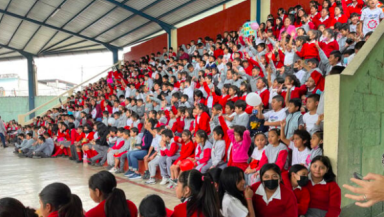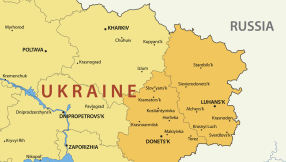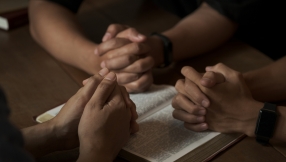
As you arrive at the public school in Terra Nueva, a neighbourhood in this city connected by bridges to Guatemala City, the high-pitched babble coming from the other side of the school wall, if you close your eyes, could be coming from happy, excited children anywhere.
But Terra Nueva is a tough area. Potholed roads make journeys difficult. Shops on the main thoroughfares are rundown. Many families have endured poverty and disruption since the time of the nation's civil war, which lasted nearly four decades and led many rural families to move to the metropolitan area's relative safety. But the cities have a high level of crime, much of it linked to gangs.
Many children in the Guatemala City metropolitan area leave school at 14; in rural areas it can be as young as eight. For those who do attend, there's often a shortage of teaching materials, including textbooks and modern reading devices. In Mixco, 650 pupils share just 12 computers.
In response to these challenges, Mixco school administrators have introduced a programme created by the Bible Society in the United Kingdom, called Open the Book, that dramatizes Bible stories, with students singing and dancing along as a way of learning both reading and the Bible.
As the Open the Book actors arrived for one of their bimonthly visits last fall, the classroom full of students in red uniforms, from kindergarten to middle school age, burst into applause. The tale that unfolded, "Free at Last," was based on the Exodus story of the Israelites fleeing Egypt, with the parting of the Red Sea ingeniously but simply depicted with a large blue cloth decorated with fish that then closed over the Egyptians as they pursued the Israelites.
Some of the students were drafted into the telling of the story, with impromptu costumes, including crowns and headdresses, made from paper and towels.
After the dramatization came a reflection and a prayer. "I liked that God had freed me," said Justin, 11, who played an Israelite. "Bible stories help me to be smarter and to learn about God."
The 220-year-old Bible Society, part of a movement founded by British evangelical Christians, is part of the worldwide United Bible Societies, which includes the American Bible Society and the Bible Society of Guatemala. The Guatemalan group, which has 50 staff members, relies on 1,000 volunteers to help take its programmes into schools.
Cesar Sanchez, the Open the Book project manager, began as a volunteer. "I met them through the work they do with vulnerable children and communities, and that's what attracted me to the work they do," he said. "I've seen it make a difference."
The Guatemala City slum of El Mezquital is perched on the rim of several ravines in the south of the city, where some 4,000 families from the countryside settled in the 1980s. With the help of UNESCO and the Catholic Church, housing and schools were built and water brought in. The national government, with World Bank funds, is connecting El Mezquital to the electric and sewer systems and putting in a main road, but it remains one of the most deprived parts of Guatemala City.
The El Mezquital Public School used to be a correctional facility, and its past seems to haunt it: The older children recall a gang shootout that killed a woman at the school's gates. The staff have tried to soften its edges with plenty of pictures and lots of plants. "The gangs try to get young boys to join," said Annalise Palma of the Bible Society of Guatemala. Because they know children won't be sent to jail, the gangs give them cell phones and teach them how to extort money by phone.
"Parents won't let their children out at night because it is too dangerous; even if it's a church service they don't go," said Palma.
Evelyn Divas, 47, head teacher at El Mezquital's public school, was hesitant about bringing Bible studies into the school — for one thing, she said, she was the only practising Christian teacher in the school. "I was worried they'd all think I was there just to impose my beliefs on them," she said. "At first everyone was hesitant of the project, and it's hard for people to warm up to it."
Now, she says, people have accepted it, and the children enjoy it.
Alison Estefinea Gutierrez, 11, said she has lost three cousins to gang violence and that the Bible Society lessons, which are held in the assembly hall at the school, have helped her deal with the violence. "Reading the Bible," she said, "helped me forgive, and I've become less aggressive."
Another El Mezquital schoolgirl, Mayerly Martinez, said: "Living here, you see a lot of conflict and you hear gunshots all the time. You get used to people being killed. It's how things are."
Teenage boys who get caught up in crime usually end up at the Etapa II Detention Center, in a woodland clearing outside Guatemala City, where 108 prisoners, ages 14-18, are kept in cells surrounded by guards and barbed wire. They are charged with offenses such as carrying illegal weapons, extortion and murder, but the judicial process is so slow it can take up to seven years for a case to come to trial.
Classes are held in the detention centre, and the teens can also enroll in correspondence courses. The Bible Society also comes fortnightly to hold Open the Book sessions, which lead to discussion about values and honesty. The boys can also request prayers. At a recent session held on a baseball court ringed by cells, boys with shaved heads, dressed in white T-shirts and sweatpants, stared through their cell grilles.
Among the boys was Wilson, 15, whose older brother died in front of him. "I heard the gunshots and then saw him bleed out," he recalled. "I wanted revenge, so when I was 14 I joined a gang." One day he was sitting with a friend who, Wilson said, had a gun, but the police arrested Wilson. After three months in detention and attending Open the Book sessions, he said his view is changing. "It's not for me to seek revenge," he said.
If young boys from the barrios tend to get pulled into crime, teenage girls are apt to get pregnant. The age of consent is 15, and there is little by way of sex education or access to contraception for teens. Abortion is illegal. Children Having Children is another outreach connected to the Bible Society that works with young teenage girls under 18 who are in this situation, teaching the girls about parent-child relationships. "We give them a course for three months to educate them, to show that you can raise kids without punishment or hitting them."
The father of 15-year-old Nally Lavery's child persuaded her to sleep with him because he claimed he could not father children. When she told him she was pregnant, Lavery says, he said it could not be his child. Children Having Children has been a lifeline, providing support and encouragement for her to continue her studies.
"Coming here motivates me," said Lavery, "and knowing that I will keep my baby and look after it." Her mother was angry at first, Lavery said, because she wanted something different for her daughter - Lavery's mother was first pregnant at 16, and her own children all have different fathers.
According to Palma, the Bible Society of Guatemala's project manager, "There is a cycle going on with young girls in this situation. They are stigmatized for having children, while the boys responsible get away with it, they just walk away, but the same thing happens again in the next generation. We need to break that cycle."
In January, Guatemala's new president, the anti-corruption reformer Bernardo Arévalo, took office after months of unrest following the country's August elections. He promises to change the fortunes of young Guatemalans with a focus on education. GT News, the government news agency, reported in February that the minister for education planned to refurbish 10,000 schools in the administration's first 12 months.
Far more difficult will be countering crime networks and deeply embedded corruption, the platform on which Arévalo was elected. Sophisticated money laundering schemes, smuggling and fraud help blur the line between the drug trade and politics, according to the think tank Insight Crime. Those who suffer the most tend to be the poorest, with predatory gangs involved in extortion in poor urban neighborhoods.
Arevalo believes education is the answer here, too. Visiting a school renovation project, the president said, "For a long time, we have not invested in the same way to bring development to all communities in the country. The future of the children is at stake in the schools, and the future of the country is at stake in the children's education."
But for now, it is the teachers who must operate at the border between education and the world of gangs and the drug trade. Divas, the head teacher in El Mezquital, said some of her students are the children of gang members. Some parents are in prison for murder, kidnapping and extortion.
According to Divas, the Bible programme is about showing the children values that are different from those of the gang culture. "I see this project as planting a seed ... inviting them to live a life that is good. They may not even understand it right now, but I know they will someday."
And, says Divas, those values can work their way into the wider culture.
© Religion News Service













